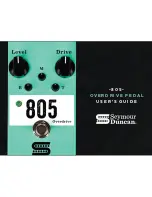
The “switch on” power supply current is less than 1µA
(micro amp) on the signal ground at the INPUT jack. This is
approximately 45,000 times (-93dB) less than the commonly
used method of connecting the battery’s negative terminal
to ground via the sleeve of the plug inserted into the INPUT
jack. The “switch on” sensing method used in the FEA
PHOTON FUZZ keeps nearly all of the circuit’s generated
white noise and transient currents out of the INPUT stage
signal ground. Extreme measures have been taken to keep
the power and signal paths as clean as possible. NOTE:
Unplug the cord from the INPUT jack when not in use to
prolong battery life.
Features:
DRIVE control to adjust the fuzz signal gain for depth and
sustain.
BITE control selects the point where the “photon clipping”
engages upon the signal.
LEVEL adjusts the fuzz output level.
LOW and HIGH boost/cut EQ controls for the fuzz tone.
ACTIVATE foot switch places the Photon Fuzz in the signal
chain or in buffered Bypass mode.
OCTAVE foot switch activates a post fuzz and EQ octave-up
type of distortion.
OCTAVE control adjusts the level of the octave-up distortion
when activated.
DRY control sets the level of the clean dry signal to be mixed
with the fuzz distortion.
ACNR (Active Coring Noise Reduction) control sets a dead
zone around the zero crossing in the amplitude of the fuzz
signal. This allows for no dead zone, to a small zone for
noise reduction, to a wider zone for a gated fuzz effect.
Two DIP switches provide three selectable pre-fuzz high-
pass filter frequencies of 55Hz, 110Hz and 220Hz.
Two DIP switches that select the octave distortion high
frequency cut-off for full-band, 4KHz or 500Hz.
Two DIP switches that select the dry signal blend high
frequency cut-off for full-band, 1.6KHz or 160HZ.
The power supplies onboard voltage charge pump allows the
circuitry to operate at 18volts (+9 and
–9 volt rails) from a
single 9 volt battery or 9 volt DC power adapter. This allows
the signal plenty of headroom from active electronic guitars
and aggressive playing techniques.
Page 3
Page 4






















